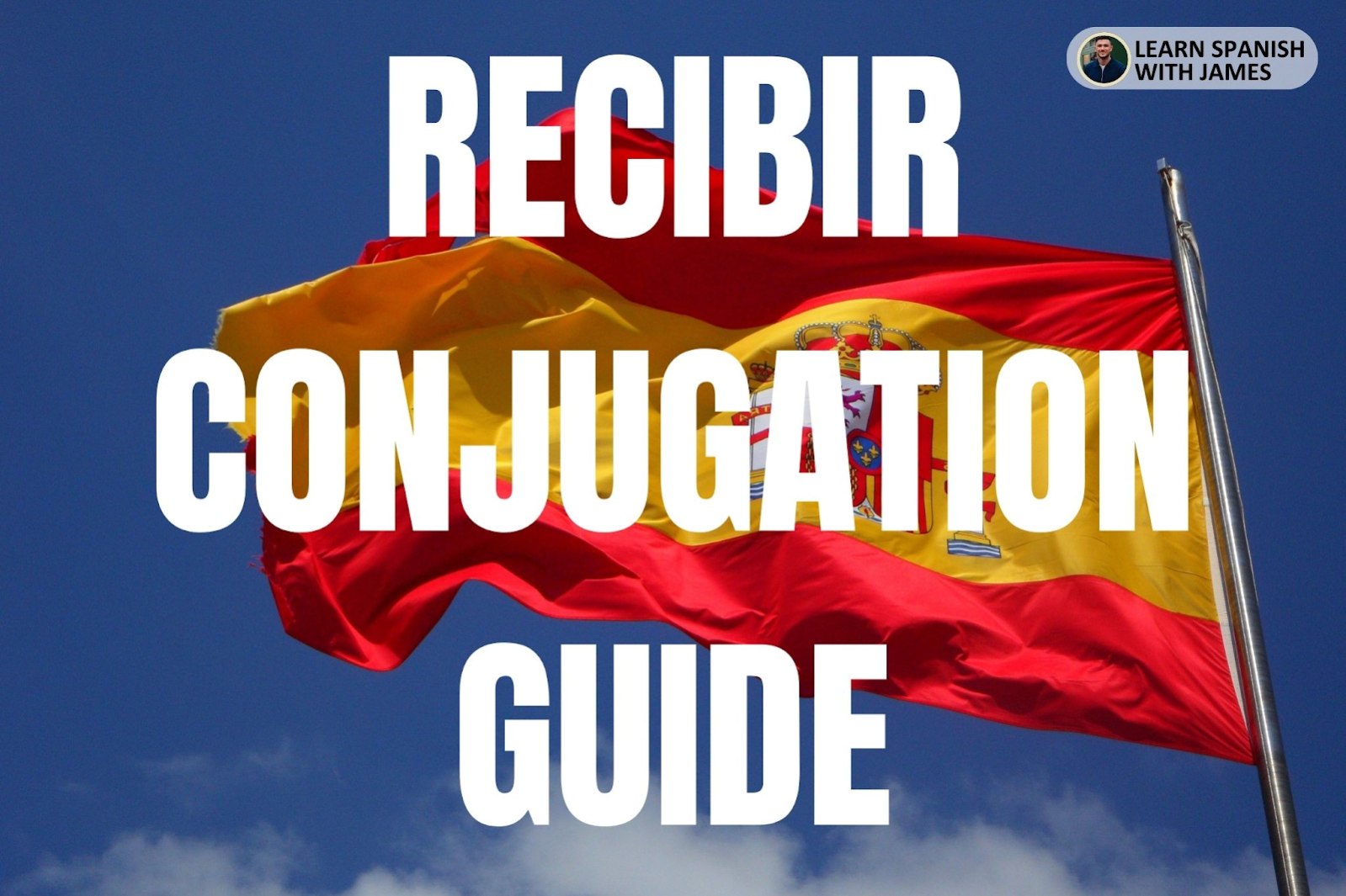Recibir Conjugation Chart & Full Tense Guide

In this guide, you’ll learn how to conjugate “recibir”, a Spanish -ir verb meaning ”to receive.”
I’m James, from Learn Spanish With James, and the host of the Learn Spanish With James Podcast.
Read on to find every ”recibir” conjugation in verb charts, with example sentences and translations.
Present Tense
Pronouns Pronombres Conjugation
I yo recibo
you tú recibes
he,she,it, you(formal) él,ella,usted recibe
we nosotros,nosotras recibimos
you pl. vosotros, vosotras recibís
they, you pl. (formal) ellos,ellas,ustedes reciben
When We Use the Present Tense
We use the present tense in Spanish to express actions that are currently happening, as well as habitual actions.
The present tense is formed by removing the infinitive ending (be it -ar, -er, or -ir) and adding the appropriate present tense endings (-o, -es, -e, -emos, -éis, -en).
You’ll see these in the conjugation chart above, as well as within the example sentences below.
Examples of “Recibir” in the Present Tense
- Yo recibo un paquete cada semana. (I receive a package every week.)
- Tú recibes una carta cada semana. (You receive a letter every week.)
- Él/ella recibe buenas noticias. (He/she receives good news.)
- Nosotros recibimos muchos regalos en Navidad. (We receive many gifts at Christmas.)
- Vosotros recibís la comida con gratitud. (You all receive the food with gratitude.)
- Ellos/ellas reciben ayuda de sus amigos. (They receive help from their friends.)
Preterite Tense
Pronouns Pronombres Conjugation
I yo recibí
you tú recibiste
he, she. it, you (formal) él, ella, usted recibió
we nosotros, nosotras recibimos
you (plural) vosotros, vosotras recibisteis
they, you (pl. formal) ellos, ellas, ustedes recibieron
When We Use Preterite Tense
The preterite tense is used to express completed actions in the past with a specific endpoint.
For example, “I received good news”. It differs from the imperfect tense and the perfect tense, which we’ll come on to shortly.
In Spanish, the preterite tense for regular -ir verb is formed by removing the infinitive ending and adding the appropriate preterite tense endings (-é, -aste, -ó, -amos, -asteis, -aron).
Examples of “Recibir” in Preterite Tense
- Yo recibí tu mensaje anoche. (I received your message last night.)
- Tú recibiste el premio la semana pasada. (You received the prize last week.)
- Él/ella recibió una llamada importante. (He/she received an important call.)
- Nosotros recibimos la invitación para la fiesta. (We received the invitation to the party.)
- Vosotros recibisteis las instrucciones claramente. (You all received the instructions clearly.)
- Ellos/ellas recibieron un regalo sorpresa. (They received a surprise gift.)
Imperfect Tense
Pronouns Pronombres Conjugation
I yo recibía
you tú recibías
he, she, it, you (formal) él, ella, usted recibía
we nosotros, nosotras recibíamos
you (plural) vosotros, vosotras recibíais
they, you(pl. formal) ellos, ellas, ustedes recibían
When We Use Imperfect Tense
The imperfect tense is used to express ongoing or habitual actions in the past.
For this reason, you’ll often hear this tense used during storytelling, and you’ll come across it often in Spanish literature.
The imperfect tense for is formed by removing the infinitive ending and adding the appropriate imperfect tense endings (-ía, -ías, -ía, -íamos, -íais, -ían).
Top Tip: This tense pattern stays the same for all -ER and -IR verbs in Spanish, even the irregular ones!
Get used to this tense by checking out these conjugation guides: “escribir“, “seguir“, “decir” “decidir“, and “pedir“.
Examples of “Recibir” in the Imperfect Tense
- Yo recibía cartas de mis abuelos cada mes. (I used to receive letters from my grandparents every month.)
- Tú recibías visitas de tus amigos los sábados. (You used to receive visits from your friends on Saturdays.)
- Él/ella recibía el periódico todas las mañanas. (He/she used to receive the newspaper every morning.)
- Nosotros recibíamos muchos elogios por nuestro trabajo. (We used to receive many compliments for our work.)
- Vosotros recibíais ayuda de vuestros vecinos. (You all used to receive help from your neighbors.)
- Ellos/ellas recibían regalos en sus cumpleaños. (They used to receive gifts on their birthdays.)
Future Tense
Pronouns Pronombres Conjugation
I yo recibiré
you tú recibirás
he,she,it, you(formal) él,ella,usted recibirá
we nosotros,nosotras recibiremos
you pl. vosotros, vosotras recibiréis
they, you pl. (formal) ellos,ellas,ustedes recibirán
When We Use the Future Tense
The future tense expresses actions that will happen in the future. The crucial word to remember here is “will”.
This means it differs from the conditional tense, which we’ll cover next.
In order to form the future tense in Spanish, we need to add the appropriate future tense endings to the infinitive form of the verb.
You’ll see these in the “recibir” conjugation chart above, and in context below.
Examples of “Recibir” in the Future Tense
- Yo recibiré tu respuesta pronto. (I will receive your response soon.)
- Tú recibirás un regalo en tu cumpleaños. (You will receive a gift on your birthday.)
- Él/ella recibirá una promoción en el trabajo. (He/she will receive a promotion at work.)
- Nosotros recibiremos noticias de ellos más tarde. (We will receive news from them later.)
- Vosotros recibiréis un aumento de sueldo. (You all will receive a salary raise.)
- Ellos/ellas recibirán reconocimiento por su esfuerzo. (They will receive recognition for their effort.)
Conditional Tense
Pronouns Pronombres Conjugation
I yo recibiría
you tú recibirías
he,she,it, you(formal) él,ella,usted recibiría
we nosotros,nosotras recibiríamos
you pl. vosotros, vosotras recibiríais
they, you pl. (formal) ellos,ellas,ustedes recibirían
When We Use the Conditional
The conditional tense is used to express actions that would happen under certain conditions or hypothetical situations.
For example, “I would receive”.
In Spanish, we conjugate ”recibir” for the conditional by adding the appropriate conditional tense endings (-ía, -ías, -ía, -íamos, -íais, -ían) to the infinitive verb.
This makes it one of the easiest Spanish verb tenses to learn.
Examples of the Conditional “Recibir” Conjugation
- Yo recibiría el premio si participara. (I would receive the prize if I participated.)
- Tú recibirías ayuda si la necesitaras. (You would receive help if you needed it.)
- Él/ella recibiría el reconocimiento merecido. (He/she would receive the deserved recognition.)
- Nosotros recibiríamos más invitados si tuviéramos espacio. (We would receive more guests if we had space.)
- Vosotros recibiríais el apoyo de la comunidad. (You all would receive support from the community.)
- Ellos/ellas recibirían atención médica adecuada. (They would receive proper medical attention.)
Perfect Tense
Pronouns Pronombres Auxiliary verb ‘haber’ Past Participle
I yo he recibido
you tú has recibido
he,she,it, you(formal) él,ella,usted ha recibido
we nosotros,nosotras hemos recibido
you pl. vosotros, vosotras habéis recibido
they, you pl. (formal) ellos,ellas,ustedes han recibido
When We Use the Perfect Tense
The preterite perfect tense is used to express actions that have been completed before a specific point in the past.
In Spanish, we form this tense by using the auxiliary verb “haber” in the preterite tense followed by the past participle of the main verb.
This is a sentence structure you’ll need to learn in order to master many verb tenses in Spanish.
Examples of the Preterite Perfect “Recibir” Conjugation
- Yo he recibido tu mensaje. (I have received your message.)
- Tú has recibido la noticia, ¿verdad? (You have received the news, right?)
- Él/ella ha recibido una oferta de trabajo. (He/she has received a job offer.)
- Nosotros hemos recibido el pago por adelantado. (We have received payment in advance.)
- Vosotros habéis recibido el reconocimiento merecido. (You all have received the deserved recognition.)
- Ellos/ellas han recibido instrucciones claras. (They have received clear instructions.)
Pluperfect Tense
Pronouns Pronombres Auxiliary verb ‘haber’ Past Participle
I yo había recibido
you tú habías recibido
he,she,it, you(formal) él,ella,usted había recibido
we nosotros,nosotras habíamos recibido
you pl. vosotros, vosotras habíais recibido
they, you pl. (formal) ellos,ellas,ustedes habían recibido
When We Use the Pluperfect Tense
The pluperfect tense expresses actions that had occurred before another past action.
For example, “I had believed in a greater being all my life”.
In Spanish, the pluperfect tense is used by conjugating the auxiliary verb “haber”, followed by the past participle of the main verb.
I have provided examples below.
Examples of the Pluperfect “Recibir” Conjugation
- Yo había recibido tu llamada antes de salir. (I had received your call before leaving.)
- Tú habías recibido la confirmación por correo electrónico. (You had received the confirmation by email.)
- Él/ella había recibido el informe completo. (He/she had received the complete report.)
- Nosotros habíamos recibido las indicaciones previamente. (We had received the instructions beforehand.)
- Vosotros habíais recibido el paquete antes de que saliéramos. (You all had received the package before we left.)
- Ellos/ellas habían recibido las instrucciones detalladas antes del inicio del proyecto. (They had received detailed instructions before the start of the project.)
Future Perfect Tense
Pronouns Pronombres Auxiliary verb ‘haber’ Past Participle
I yo habré recibido
you tú habrás recibido
he,she,it, you(formal) él,ella,usted habrá recibido
we nosotros,nosotras habremos recibido
you pl. vosotros, vosotras habréis recibido
they, you pl. (formal) ellos,ellas,ustedes habrán recibido
When We Use Future Perfect Tense
The future perfect tense in Spanish allows us to express actions that will have been completed by a certain point in the future.
If we take the verb “recibir”, an example of this tense is “I will have believed”.
Just like previous examples, this tense is formed by using the future tense of the auxiliary verb “haber” followed by the past participle of “recibir” – (recibido)
Examples of “Recibir” in Future Perfect
- Yo habré recibido tu respuesta para entonces. (I will have received your response by then.)
- Tú habrás recibido la confirmación antes de la reunión. (You will have received the confirmation before the meeting.)
- Él/ella habrá recibido el paquete al mediodía. (He/she will have received the package at noon.)
- Nosotros habremos recibido las instrucciones con anticipación. (We will have received the instructions in advance.)
- Vosotros habréis recibido las noticias del proyecto mañana. (You all will have received the project news tomorrow.)
- Ellos/ellas habrán recibido el mensaje antes de la hora límite. (They will have received the message before the deadline.)
Conditional Perfect Tense
Pronouns Pronombres Auxiliary verb ‘haber’ Past Participle
I yo habría recibido
you tú habrías recibido
he,she,it, you(formal) él,ella,usted habría recibido
we nosotros,nosotras habríamos recibido
you pl. vosotros, vosotras habríais recibido
they, you pl. (formal) ellos,ellas,ustedes habrían recibido
When We Use Conditional Perfect
The conditional perfect tense is used to express actions that would have been completed under certain conditions in the past.
We can form this tense by using the conditional tense of the auxiliary verb “haber” followed by the past participle of “recibir” which, as we already know, is “recibido”.
Examples of “Recibir” in Conditional Perfect
- Yo habría recibido el regalo si lo hubieras enviado. (I would have received the gift if you had sent it.)
- Tú habrías recibido la oportunidad de estudiar en el extranjero. (You would have received the opportunity to study abroad.)
- Él/ella habría recibido el reconocimiento si hubiera participado. (He/she would have received the recognition if he/she had participated.)
- Nosotros habríamos recibido más invitados si hubiéramos tenido más espacio. (We would have received more guests if we had had more space.)
- Vosotros habríais recibido el premio si hubierais sido nominados. (You all would have received the prize if you had been nominated.)
- Ellos/ellas habrían recibido la noticia con alegría si la hubieran escuchado. (They would have received the news with joy if they had heard it.)
Present Subjunctive
Pronouns Pronombres Conjugation
I yo reciba
you tú recibas
he,she,it, you(formal) él,ella,usted reciba
we nosotros,nosotras recibamos
you pl. vosotros, vosotras recibáis
they, you pl. (formal) ellos,ellas,ustedes reciban
When We Use Present Subjunctive
The present subjunctive tense is used to express desires, doubts, or uncertainties.
In order to create the present subjunctive, we take the present indicative form, remove these endings, and add the appropriate subjunctive endings (-e, -es, -e, -emos, -éis, -en).
Examples of “Recibir” in Present Subjunctive
- Yo espero que tú recibas buenas noticias. (I hope that you receive good news.)
- Es importante que tú recibas apoyo en estos momentos. (It’s important that you receive support at these times.)
- Quiero que él/ella reciba el reconocimiento que merece. (I want him/her to receive the recognition he/she deserves.)
- Es necesario que nosotros recibamos una ayuda adicional. (It’s necessary that we receive additional help.)
- Insisto en que vosotros recibáis instrucciones claras. (I insist that you all receive clear instructions.)
- Dudo que ellos/ellas reciban el premio. (I doubt that they receive the prize.)
Imperfect Subjunctive
Pronouns Pronombres Conjugation
I yo recibiera, recibiese
you tú recibieras, recibieses
he,she,it, you(formal) él,ella,usted recibiera, recibiese
we nosotros,nosotras recibiéramos, recibiésemos
you pl. vosotros, vosotras recibierais, recibieseis
they, you pl. (formal) ellos,ellas,ustedes recibieran, recibiesen
When We Use Imperfect Subjunctive
The imperfect subjunctive tense is used to express hypothetical or uncertain situations in the past.
I have provided examples of the imperfect subjunctive in context below.
Examples of “Recibir” in Imperfect Subjunctive
- Yo recibiera la carta si estuviera en casa. (I would receive the letter if I were at home.)
- Esperaba que tú recibieras buenas noticias. (I hoped that you would receive good news.)
- Era necesario que tú recibieras apoyo en ese momento. (It was necessary that you received support at that time.)
- Deseaba que él/ella recibiera el reconocimiento merecido. (I wished that he/she received the deserved recognition.)
- Queríamos que nosotros recibiéramos una ayuda adicional. (We wanted us to receive additional help.)
- Insistíamos en que vosotros recibierais instrucciones claras. (We insisted that you all received clear instructions.)
- Dudábamos que ellos/ellas recibieran el premio. (We doubted that they received the prize.)
Affirmative Imperative
Pronouns Pronombres Conjugation
you tú ¡recibe!
he,she,it, you(formal) él,ella,usted ¡reciba!
we nosotros,nosotras ¡recibamos!
you pl. vosotros, vosotras ¡recibid!
they, you pl. (formal) ellos,ellas,ustedes ¡reciban!
When We Use The Affirmative Imperative
We use the affirmative imperative to give direct commands or orders in a positive manner.
Examples of this with “recibir” are below.
Examples of “Recibir” in the Affirmative Imperative
- Recibe el paquete cuando llegue. (Receive the package when it arrives.)
- Recibid a los invitados con alegría. (Receive the guests with joy.)
- Reciba tu hermana el premio con orgullo. (Receive your sister the prize with pride.)
Negative Imperative
Pronouns Pronombres Conjugation
you tú ¡no recibas!
he,she,it, you(formal) él,ella,usted ¡no reciba!
we nosotros,nosotras ¡no recibamos!
you pl. vosotros, vosotras ¡no recibáis!
they, you pl. (formal) ellos,ellas,ustedes ¡no reciban!
When We Use The Negative Imperative
The negative imperative is used to give direct commands or orders in a negative manner, instructing someone not to perform an action.
In Spanish, the imperative form for “tú” is formed by using the present subjunctive form without the subject pronoun.
Examples of “Recibir” in the Negative Imperative
- No recibas llamadas durante la reunión. (Don’t receive calls during the meeting.)
- No recibáis a extraños en casa. (Don’t receive strangers at home.)
- No reciba usted ningún regalo sin identificar. (Don’t receive any unidentified gifts.)
Online Spanish Courses & Grammar Courses
I hope you found this “recibir” conjugation guide useful 🙂
For a full list of Beginner, Intermediate and Advanced Courses, check out this full list of online Spanish courses.
I put this list together myself, and it comprises a mixture of courses that offer Spanish grammar practice for all levels, Spanish verb conjugation guides, conversational practice, listening and writing exercises in Spanish, free Spanish courses, and a whole lot more.
The fastest way to learn Spanish is to test a mixture of Spanish resources and choose the course that coincides most with your learning style.
In addition to online Spanish courses, on this site you will find a wide range of Spanish podcasts, Spanish apps, Spanish YouTube channels, and both online and physical Spanish language schools.

About James – Or Should that be Santiago?
My name is James. I am a Brit with a love for the Spanish language. I have lived in Spain, Argentina, and Costa Rica, and I have been teaching Spanish for over a decade. This site will show you how to master the elements of Spanish grammar that often dishearten learners. I hope you enjoy the site and find it useful.
If you are interested in taking your Spanish to the next level, check out the Courses section for a full list of the Spanish courses I suggest. All reviews are based on my personal opinions.





